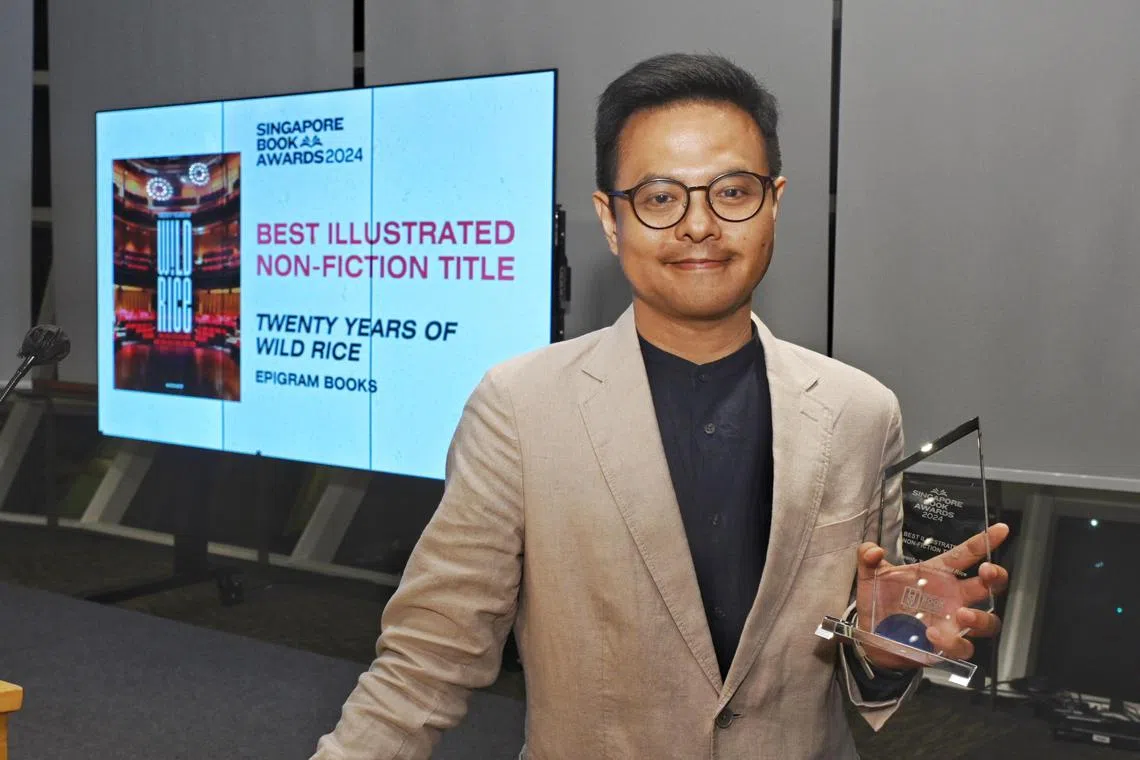Myle Yan Tay wins Best Literary Work and Book of the Year at the Singapore Book Awards 2024
Sign up now: Get ST's newsletters delivered to your inbox
Follow topic:
SINGAPORE – Playwright and author Myle Yan Tay went home with two top prizes at the Singapore Book Awards 2024, winning Best Literary Work and Book of the Year for his debut novel catskull (2023).
Organised by the Singapore Book Publishers Association, the award was launched in 2012 for books published in Singapore.
Accepting the award on behalf of her son, who is in Chicago, Illinois, working for nonprofit A Safe Haven Foundation, Mrs Meena Tay said: “I am extremely proud of him. Notwithstanding the fact that I am his mother, I really enjoyed the book. It has so much to say about life in Singapore, being young in Singapore, the education system and how we treat our migrant workers. I’m just gobsmacked that it won both awards.”
Laughing, she added: “I’ve been messaging the family group chat with updates and everyone has responded except for him, so he may still be asleep.”
Tay, 29, told The Straits Times over e-mail: “I wrote catskull for my teenage self, lost, confused, often angry at a world he didn’t understand. So it’s surreal to see this immensely personal book be recognised, with all its idiosyncrasies and quirks.
“I’m grateful to be among such extraordinary peers and to have the fervent support of my friends and family. To be read at all is a privilege I don’t take lightly, and I’d like to thank Ethos Books for doing the hard, hard work of championing local literature.”
The novel follows a teenager named Ram who becomes a vigilante, fighting the injustices he sees in Singapore. It has also been shortlisted for the Singapore Literature Prize.
In her review of the book for ST
Best Non-Fiction Title went to Not Without Us: Perspectives On Disability And Inclusion, edited by Kuansong Victor Zhuang, Meng Ee Wong and Dan Goodley. The collection of essays challenges the ways in which people research, analyse and think about disability in daily life, as well as what it means to live with a disability in Singapore.

Meng Ee Wong, one of the editors for Not Without Us, accepts the award for Best Non-Fiction Title.
ST PHOTO: DESMOND WEE
Non-fiction judge Kum Suning, editorial manager at the Apac branch of the Walt Disney Company publishing team, says of the book: “It puts forth perspectives that are highly relatable to everyday living. I think while these topics are not mainstream, they are important.”
Best Illustrated Non-Fiction Title went to Twenty Years Of Wild Rice, by the theatre company’s resident playwright Alfian Sa’at

Wild Rice’s resident playwright Alfian Sa’at wins for Best Illustrated Non-Fiction with Twenty Years Of Wild Rice.
ST PHOTO: DESMOND WEE
The awards drew 145 submissions by 35 publishers across 12 categories, including Best Young Person’s Fiction and Best Marketing Campaign. The Best Food Book is a new category that recognises the food culture in Singapore.
Non-fiction judge Gene Tan, chief librarian and chief innovation officer at the National Library Board, says of 2024’s prize contenders: “There were so many iconic works – from Alfian Sa’at capturing the stupendous arc of Wild Rice’s evolution to a refreshing graphic novel on Dr Goh Keng Swee to the truly inclusive Not Without Us capturing all the facets of disability in Singapore. There simply wasn’t any one trend, other than how so many writers and publishers found their wheelhouse and just went for it.”
However, Ms Kum notes that five out of the eight non-fiction nominees were memoirs of Singaporean men. While she acknowledges that there are lessons to be learnt from their stories, she expresses hope for more diversity in the future.
On catskull winning Book of the Year, Mr Tan says: “We are always in search of a distinctive voice in Singapore writing. Myle Yan Tay has achieved probably the most difficult thing for any new writer – to have a complete mastery of the voice of the characters so that the author never once intrudes. For me, there was simply no other choice for Book of the Year.”
Ms Kum adds: “I think it’s searing and going to be very resonant with Singaporeans because of how realistic and rooted it is in local issues. When I think of catskull, I think of Fight Club (1996), but a Singapore version. It’s fiction, but it’s also a mirror.”


